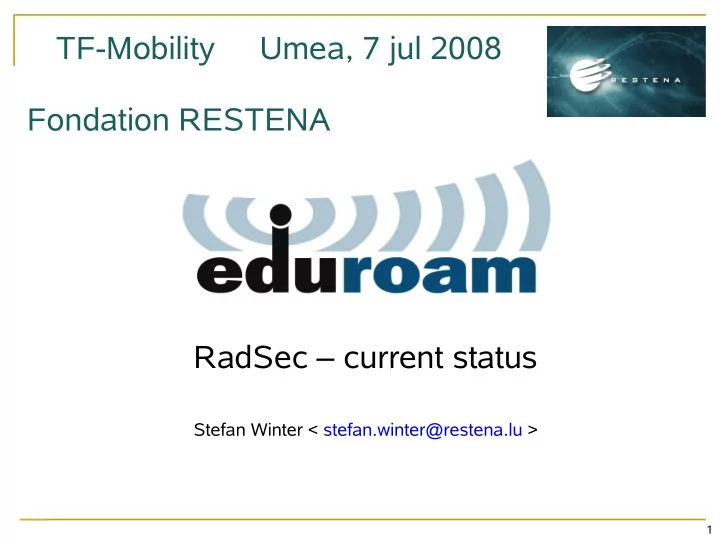

TF-Mobility Umea, 7 jul 2008 Fondation RESTENA RadSec – current status Stefan Winter < stefan.winter@restena.lu > 1
Internet-Draft update Recharter is done! Radext officially takes on the work items of RADIUS over TCP (STD track) TLS security for RADIUS over TCP (EXP) RADIUS over TCP Draft -00 from Alan DeKok Aims for TCP/1812 as standard port PDU format unchanged TLS security for RADIUS over TCP As reported to the list 2
Implementation update Lancom AP firmware >= 7.52 Released, working, in my AP :-) radsecproxy 1.1 Beta Final release imminent Has nice loop detection (but... see next slide) FreeRADIUS Work started TCP transport is already implemented eduroam@home First non-Stefan field experiences by Vic Giralt 3
Loop Detection and RadSec RADIUS: client and server can check Client: if packet contains own realm, don't send Server: if receiving packet and would be sent back to originator, don't send RadSec: <ServerRADSEC> clause doesn't offer a hint who the originating IP address that initiated request is (Client|Proxy)-Identifier matching won't work 4
Loop Detection (2) Solution 1: Make your clients check realms! Should be the case “ever since” Solution 2: Check IP address of connecting client and compare with server to forward to A bit flaky Solution 3: Your solution here! 5
Plans produce a few eduroam@home APs and see how end-users like it (unchanged) Finish RFCs More dissemination work 6
“Vision of the Future” some people are a lot more enthusiastic about RadSec than I am for current RADIUS “IdPs”: deploy a RadSec proxy in front of it, publish your certificate proxy is lightweight no critical data exposed by doing so bootstrapping a roaming consortium gets easier technically: user's home can be found via DNS lookup automatically add the IdP's cert as “trusted” for your service IdP: accept SPs cert for auth 7
Maths, RADIUS and you unpleasant surprise in Rome: very unreliable network, packet loss peaked at 20% International Roaming: EAP over RADIUS: ~ 8 roundtrips per auth = 16 UDP packets per auth, end-to-end 5 RADIUS (AP -> SP -> TLD -> root -> TLD -> IdP) = 16 * 5 UDP packets per auth, hop-by-hop assume 5 IP hops between RADIUS hops on average = 16 * 5 * 5 UDP packets, individual link = 400 individual packets on wire(s) 8
Maths, RADIUS and you (2) How does reliability of individual links affect auth performance? Chance of success for a complete authentication session based on IP link reliab 99% : 0.99^400 = 1.80% 99.9% : 0.999^400 = 67.02% 99.99% : 0.9999^ 400 = 96.08% (~ one in 25 fails!) 99.999% : 0.99999^400 = 99.60% (~ one in 250 fails!) 99.9999%: 0.999999^400 = 99.96% 9
other news from IETF front phone call with three ADs: internet, security and ops area EAP and payload size in RADIUS discussed, acknowledged as a problem and a dim idea how to solve it EAPoL and error reporting to the user discussed, acknowledged as a problem suggestions to do it, but they are ugly BoF: postponed, but suggestion to hold a “bar BoF” SAML: met resistance by some, but based on an ancient view on SAML 10
something completely different homogeneity of services offered user support how does the commercial world (i.e. GSM roaming) do it? watch the insightful picture... 11
Thank you! Questions? 12
Recommend
More recommend